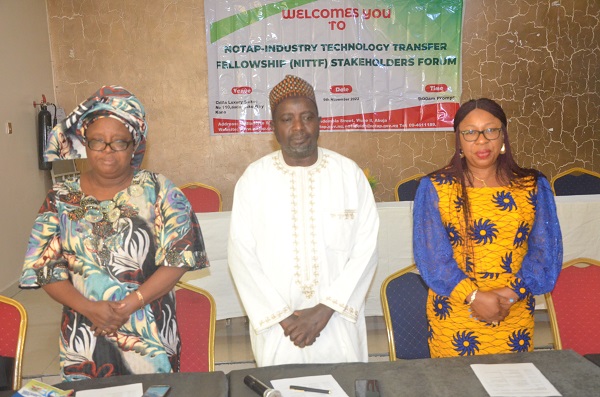
The National Office for Technology Acquisition and Promotion (NOTAP) has urged more multinational companies operating in Nigeria to key into the NOTAP-Industry Technology Transfer Fellowship (NITTF) programme for the sustainability of the production capacities of the companies.
The director-general of NOTAP, Dr. DanAzumi Ibrahim made the call during his opening remarks at a one-day NITTF stakeholders’ interactive meeting in Kano.
He said that based on the successes recorded so far by the programme, more companies operating in Nigeria are encouraged to be part of the programme.
Ibrahim said that the NITTF programme was initiated by NOTAP as a child of necessity when, while carrying out its statutory functions, the Office realised the absence of synergy between academia and the industry. He noted that Nigeria’s knowledge institutions undertake research that was not useful to the industry while the industry depended on foreign solutions each time they face challenges, hence the urgent need to bridge the gap.
The DG stated that the programme was a voluntary sponsorship of young and intelligent Nigerians who have finished their master’s degrees and desire to undertake doctorate programmes in Nigerian universities on projects that will be determined by the sponsoring companies. He informed the gathering that the first three beneficiaries were sponsored by three companies and, when other companies saw potential benefits of the programme, they declared their interests.
Ibrahim, who was represented at the meeting by the director, consultancy services of NOTAP, Dr. Adamu Tandama said though the programme is witnessing slow progress, due to the inadequate number of sponsoring companies, its long-time benefits to the benefactors and the nation at large will be enormous.
Ibrahim further stated that the meeting was slated for the sponsoring companies and the beneficiaries to meet face to face and carry out a critical evaluation of the progress recorded and, also, share their challenges and proffer solutions on how best to resolve those challenges.
Four beneficiaries of the programme made separate presentations, detailing the stages of their research work as well as challenges encountered while undertaking the research. According to the beneficiaries, their challenge ranges from epileptic power supply to inadequate research facilities.
In his response to the challenges of the beneficiaries, the head, technical department, PZ Cussons Nigeria Plc, Mr. Panganai Chatapura noted that the scholarship programme was a worthwhile venture and promised that the sponsoring companies will continue to do their best to ensure the success and sustainability of the programme.
A statement by the agency’s assistant chief information officer, Raymond Ogbu, said Chatapura expressed optimism that other companies yet to identify with the programme will do so; not just for their benefits but for the overall interest of the nations.


